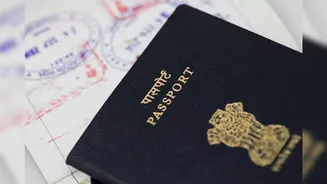Unraveling the Mystery of Late-Night Eating Habits: 8 Facts to Reconsider! Dive in to discover if your midnight snacks are a culinary crime or a harmless indulgence. Explore how eating late impacts your health,
weight, and emotional well-being. Make informed choices for a healthier lifestyle
We Indians, we love our late-night chai and samosa sessions, don’t we? Or that sneaky midnight snack of biscuits dipped in milk. But have you ever wondered if this habit of eating late is actually doing you good or causing some internal drama?
It’s a question many of us brush aside, thinking, "Arrey, what to do? Work toh late tak hai!" But hold on a minute, let’s unpack this whole "eating late" thing and see if it's a culinary crime or just a harmless indulgence.
So get ready to become a 'food detective' as we explore eight important facts that will make you rethink your late-night snacking habits.
Eating late disrupts circadian rhythm, affecting sleep quality
First things first, let's understand the basic concept. Our bodies have this amazing internal clock called the circadian rhythm. This clock regulates everything, from when we sleep to when we feel hungry.
When it gets dark, our body naturally starts producing melatonin, a hormone that makes us sleepy. Eating a heavy meal late at night can mess with this rhythm. Think of it like trying to watch a Bollywood movie while someone is constantly changing the channel.
Your body gets confused and can't decide whether to focus on digesting food or preparing for sleep. This confusion can lead to poor sleep quality, leaving you feeling groggy and tired the next day. And who wants to start the day like that, right? Nobody wants a grumpy start.
Instead, better to plan ahead for a light and easy snack before sleep.
Eating late can cause indigestion & heartburn; give 2-3 hr gap before bed
What happens when you eat that paratha around 11 pm? Well, your body has to work extra hard to digest it while you are trying to fall asleep. This can lead to indigestion, bloating, and that uncomfortable feeling of food just sitting in your stomach like a stubborn guest who refuses to leave.
Plus, when you’re lying down, it's easier for stomach acid to flow back up into your esophagus, causing heartburn. Ouch! It's important to give your body enough time to process the food you eat before hitting the pillow.
A good rule of thumb is to have at least a 2-3 hour gap between your last meal and bedtime. So next time you are reaching for that midnight snack, ask yourself, "Is this worth the potential indigestion drama?". Maybe opt for a warm glass of milk instead. It will be much kinder to your tummy!
Eating late linked to weight gain & diabetes risk; affects food processing & blood sugar
Now here's where things get a bit serious. Eating late has been linked to weight gain and an increased risk of developing type 2 diabetes. When you eat late, your body is less efficient at processing the food.

The extra calories you consume are more likely to be stored as fat, especially since you are not likely to burn them off before going to sleep. Over time, this can lead to weight gain and obesity. Moreover, late-night eating can disrupt your blood sugar levels.
Studies have shown that people who eat late have higher blood sugar levels and are more insulin resistant. This means your body has to produce more insulin to keep your blood sugar in check.
This constant strain on your insulin-producing cells can eventually increase your risk of developing type 2 diabetes. So, while that late-night chocolate brownie might seem tempting, think about the long-term implications for your health.
Eating late due to work? Make healthy choices, eat on schedule, monitor body's reaction
Of course, some of us eat late because it's simply part and parcel of our work life. Think about those BPO employees, or people working in shifts at hospitals. If you find yourself consistently eating late due to work demands, don’t worry, there are ways to mitigate the negative effects.

For starters, focus on making healthy choices, just like you tell your kids. Opt for whole grains, fruits, vegetables, and lean protein. These foods are easier to digest, provide essential nutrients, and won't overload your system.
Secondly, try to maintain a regular eating schedule as much as possible. Even if you are eating late, try to stick to the same time each day. This helps regulate your body's internal clock and improves digestion. Most importantly, monitor your body’s reaction when you eat late.
Make necessary adjustments.
Emotional eating to cope with stress and emotions
We've all been there, haven't we? Stressed from studies, the office or home shenanigans. So you reach for snacks late at night. And emotional eating does not just manifest as the occasional piece of dark chocolate.

For many, emotional eating can be a way to numb out tough emotions, such as stress, anxiety, sadness or loneliness. Eating is comfortable and known, which is the preferred alternative than feeling what we are running from.
Eating the entire packet of chips is also connected to the rewarding feeling we get when we eat junk food. So next time when you are opening the fridge, ask yourself whether you are truly hungry or you are just seeking comfort in the form of food.
If the latter is true, try finding alternative ways to cope with your emotions, such as talking to a friend, taking a walk, or practicing relaxation techniques.
Eating late is okay if it's light, healthy, and mindful
So, what’s the final verdict? Is eating late a complete no-no? Not necessarily. But it’s important to be mindful of your eating habits and make informed choices. If you are going to eat late, focus on eating light, healthy, and easily digestible food. Avoid sugary, fatty, and processed foods.
Give your body enough time to digest the food before going to bed. And most importantly, listen to your body. Pay attention to how different foods affect you and adjust your eating habits accordingly. Remember, your body is unique. The 'one size fits all' approach does not work.
Experiment what habits work for you. And if you are concerned about your eating habits, it’s always a good idea to consult with a dietician or healthcare professional. They can provide personalized advice and help you develop a healthy eating plan that suits your needs.
So eat smart, sleep well, and stay healthy!
AI Generated Content. Glance/InMobi shall have no liability for the content














